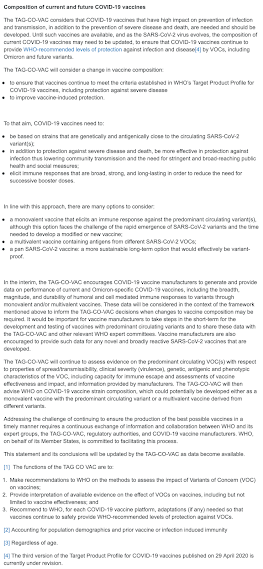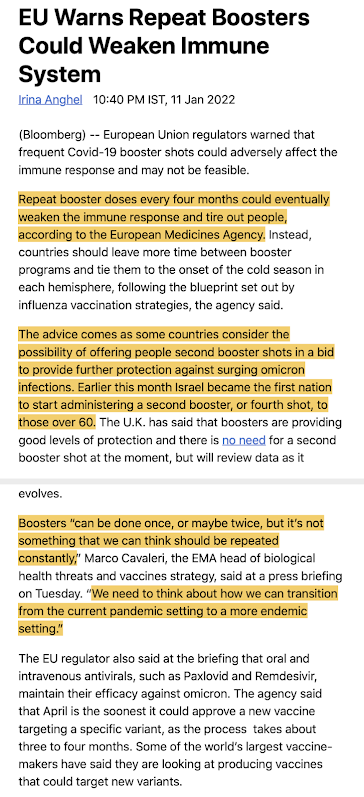An absolutely fascinating interim statement from the World Health Organization on January 11, 2022 really helps put the global response to the COVID-19 pandemic into perspective.
Here is the headline of the document:
Let's pick out some of the most salient points from the interim statement with the key phrases and sentences highlighted:
1.) Right in the introduction, we find this:
"In the context of the circulation of Omicron SARS-CoV-2 Variant of Concern, the TAG-CO-VAC urges broader access globally to current COVID-19 vaccines for primary series and booster doses, in the hope that this also mitigates the emergence and impact of new VOCs (Variants of Concern)".
The WHO certainly has high "hopes" but is far from certain that the current vaccines and boosters will prevent the emergence and impact of new VOCs, something that you won't hear from your local media or politician.
2.) "With available COVID-19 vaccines, the current focus remains on reducing severe disease and death, as well as protecting health systems. Vaccines that have received WHO Emergency Use Listing, across several vaccine platforms, provide a high level of protection against severe disease and death caused by VOCs. For the Omicron variant, the mutational profile and preliminary data indicate that vaccine effectiveness will be reduced against symptomatic disease caused by the Omicron variant, but protection against severe disease is more likely to be preserved. However, more data on vaccine effectiveness, particularly against hospitalization, severe disease, and death are needed, including for each vaccine platform and for various vaccine dosing and product regimens."
It has baffled me how organizations and politicians can claim that the current vaccines protect against severe disease when there is no way of knowing how severely a given individual will react to being infected.
3.) The World Health Organization then claims that COVID-19 vaccines need to:
a.) be based on strains that are genetically and antigenically close to the circulating SARS-CoV-2 variant(s);
b.) in addition to protection against severe disease and death, be more effective in protection against infection thus lowering community transmission and the need for stringent and broad-reaching public health and social measures;
c.) elicit immune responses that are broad, strong, and long-lasting in order to reduce the need for successive booster doses.
Obviously, from this statement, the WHO is offering a severe condemnation of the current vaccines at preventing transmission, the traditional "job" of a vaccine. Over the past few weeks, it has become very apparent that the current vaccines have failed at preventing community transmission and are, most certainly, do not provide long-lasting protection unless one happens to think that a few months (or even less) is "long-lasting". As for boosters, the use of additional doses of COVID-19 vaccines seems to be the fallback position of just about every politician today. Perhaps it would be wise for them to at least consider what the World Health Organization is saying about the failure of the current vaccines before they open their mouths and spew non-scientific nonsense.
4.) Here are the World Health Organization's recommendations/demands for future COVID-19 vaccines:
a.) a monovalent vaccine that elicits an immune response against the predominant circulating variant(s), although this option faces the challenge of the rapid emergence of SARS-CoV-2 variants and the time needed to develop a modified or new vaccine;
b.) a multivalent vaccine containing antigens from different SARS-CoV-2 VOCs;
c.) a pan SARS-CoV-2 vaccine: a more sustainable long-term option that would effectively be variant-proof.
The lack of a multivalent vaccine (vaccines that protect against more than one variant of the SARS-CoV-2 virus) is definitely problematic and goes some way to explaining the recent rapid rise in cases among the fully vaccinated and doesn't even seem to have been considered by the manufacturers of the current vaccines (at least not publicly), perhaps because of the haste to get a not-fully-tested product into the arms of human beings. Interestingly, back in January 21, 2021 as the vaccines were just rolling out, an article in Nature presciently outlined that exact issue:
"Laboratories worldwide are racing to understand the threat that emerging coronavirus variants pose for vaccines. But early insights from these studies are mixed and incomplete. A variant identified in late 2020 in South Africa, called 501Y.V2 (also known as variant B.1.351), is among the most worrying. Lab assays have found that it carries mutations that sap the potency of virus-inactivating ‘neutralizing antibodies’ that were made by people who received either the Pfizer or Moderna RNA vaccines.
Whether these changes are enough to lower the effectiveness of those vaccines is not clear, says Subbarao. “That is the million-dollar question, because we don’t know how much antibody you need.” Other immune responses that vaccines prompt might help to protect against the effects of variants.
But on 28 January, biotech firm Novavax released data from clinical trials showing that its experimental vaccine, designed to combat the original virus, was about 85% effective against a variant identified in the United Kingdom — but less than 50% effective against 501Y.V2. That drop is concerning, say researchers, because it indicates that 501Y.V2 and other variants like it can cause a significant drop in vaccines’ effectiveness.
“I think it’s inevitable for the vaccines to maintain tip-top efficacy, they will need to be updated. The only question is how often and when,” says Paul Bieniasz, a virologist at the Rockefeller University in New York City..."
Lastly, here is one of the key phrases in the document:
"With near- and medium-term supply of the available vaccines, the need for equity in access to vaccines across countries to achieve global public health goals, programmatic considerations including vaccine demand, and evolution of the virus, a vaccination strategy based on repeated booster doses of the original vaccine composition is unlikely to be appropriate or sustainable."
According to the World Health Organization, a booster-based response to the pandemic is neither appropriate nor is it sustainable, something that must really concern Big Pharma whose entire business model over the past 18 months has been COVID-19 vaccine-based.
Just in case it should happen to disappear from the internet, here is a screen capture showing the entire Interim Statement which I have archived here:
From the wording of this interim statement from the World Health Organization, it would almost appear that they have capitulated in the battle against the SARS-CoV-2 virus using mRNA technology which is clearly proving to be a less that satisfying solution to the pandemic.
Addendum:
This was reported on Bloomberg on January 11, 2022 quoting from the European Medicines Agency:









No comments:
Post a Comment